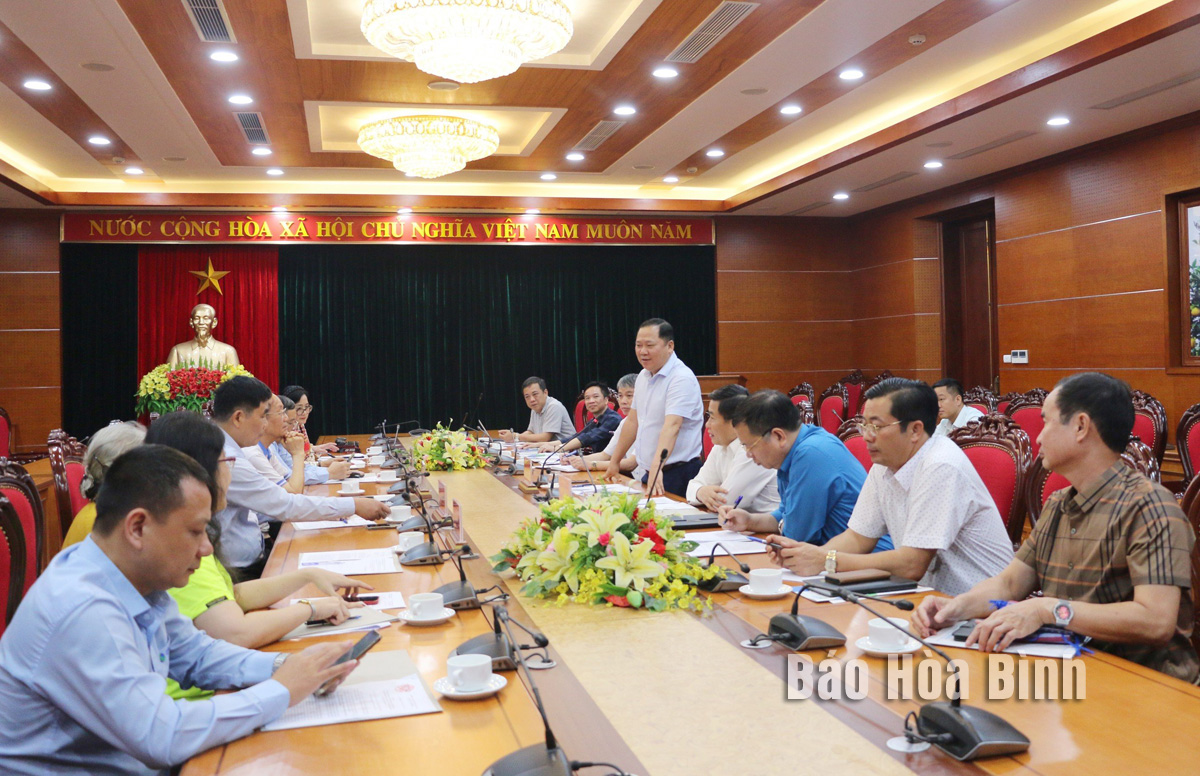
A delegation from the Fund for Natural Disaster Prevention and Control and the Hero of the People’s Armed Forces Phan Trong Binh Social Work Fund on April 22 had a working session with leaders of Hoa Binh province.

The delegation included Phan Dien, Honorary
President of the Fund for Natural Disaster Prevention and Control; and Cao Duc
Phat, former Minister of Agriculture and Rural Development, Chairman of the
Management Board of the Fund for Natural Disaster Prevention and Control.
They were received by Nguyen Phi Long, alternate
member of the Party Central Committee and Secretary of the provincial Party
Committee; and Dinh Cong Su, Vice Chairman of the provincial People’s
Committee.
Nguyen Phi Long, alternate member of the Party
Central Committee and Secretary of the provincial Party Committee, speaks at
the working session.
Since its inception 15 years ago, the Fund for
Natural Disaster Prevention and Control has implemented many programmes and
projects to help people nationwide improve their disaster resilience and ease
losses caused by natural disasters.
It has mobilised more than 609 billion VND
(24.04 million USD) so far, and supported 55 cities and provinces across the
country with 122 disaster prevention facilities. In Hoa Binh, the fund has
carried out multiple activities with a total funding of 8.3 billion VND.
At the working session, Hoa Binh suggested the
fund continue its support for the locality in disaster prevention and control,
especially its areas prone to floods and landslides, and further fund
infrastructure construction there.
In reply, Dien promised that the fund will
continue mobilising resources to help Hoa Binh raise its disaster resilience
and ease damage and risks of natural disasters in the province.
Hoa Binh province is undergoing a dynamic transformation amid Vietnam’s national digital transition. Building on Poliburo’s Resolution No. 57-NQ/TW on breakthroughs in science, technology, innovation, and national digital transformation, the province has rolled out a wide range of practical action plans. A standout initiative is the "Digital Literacy for All” movement, an effort to ensure that no one is left behind in the digital era.
Hoa Binh province is undergoing a dynamic transformation in the wake of the national digital transformation movement. Building on Resolution No. 57-NQ/TW of the Politburo on breakthroughs in science, technology, innovation, and national digital transformation, the province has implemented a wide range of practical action plans. A standout initiative is the "Digital Literacy for All” movement ambitious effort to ensure that no one is left behind in the digital age.
With a spirit of unity and proactive problem-solving, the Party Committee, the government and the people of Dong Lai Commune (Tan Lac District) have made great strides in implementing the resolutions of the 24th Party Congress of the commune for the 2020 - 2025 term. Focusing on leadership and practical actions, the commune has brought the Party’s resolutions into daily life, creating strong impacts and pushing the local development forward.
Amid the nationwide push for digital transformation, young people in Hoa Binh Province are stepping up as dynamic pioneers, applying technology to enhance Youth Union operations and expand the reach of youth-led initiatives. Through creativity and adaptability, Youth Union organizations at all levels have introduced a series of practical solutions, contributing to modern governance and community development.
In recent years, An Nghia commune, located in Lac Son district, has stepped up administrative reform, focusing on improving the quality and efficiency of its single-window service unit for receiving and processing administrative procedures. These improvements have helped create favourable conditions for local residents and organisations to handle administrative procedures, contributing to the commune’s broader socio-economic development.
The Prime Minister-approved master plan to develop the multi-use value of forests ecosystems through 2030, with a vision to 2050, aims to improve the management and sustainable use of forest resources, create jobs, increase incomes, and improve the living standards of ethnic minorities, people in mountainous and remote areas, forest workers and those living near forests.



